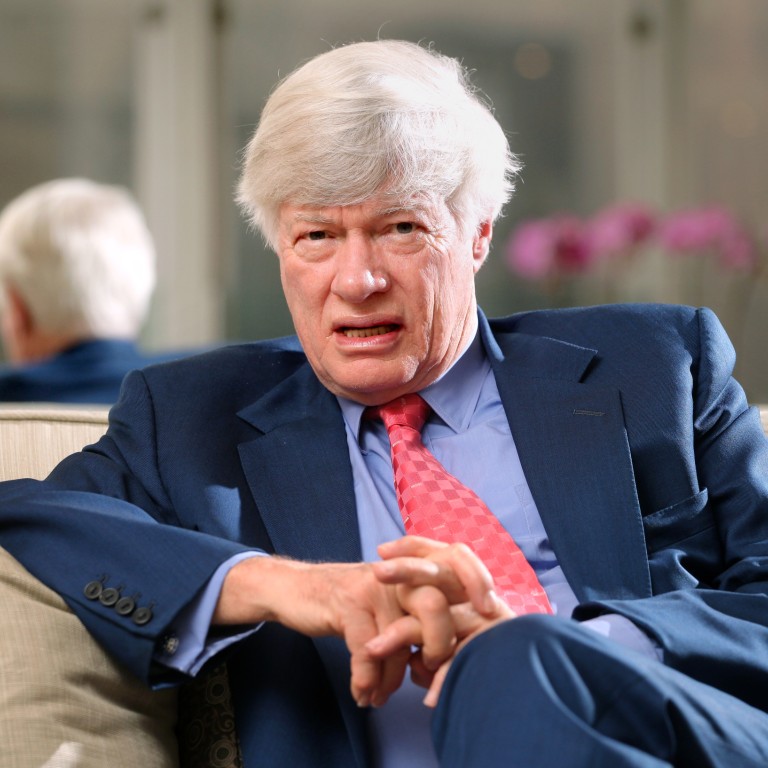
World renowned lawyer Geoffrey Robertson calls on Hong Kong government to protect press freedom
Geoffrey Robertson, Queen’s Counsel, UN war crimes judge and legal representative for Julian Assange, has called on the Hong Kong government to protect freedom of the press, which he says is “a most important sinew of a free society”.
He condemned the recent attack on former Ming Pao editor Kevin Lau Chun-to. “Killing the messenger, or maiming the messenger in this case, is something that a free society simply cannot tolerate”, said Robertson, and urged decisive action. “The government must throw every resource at first of all finding and prosecuting his assailants”, he said.
Robertson commented on the current media environment in Hong Kong, as well as the city’s role in last year’s Snowden affair, in an interview with the South China Morning Post on Friday morning. The lawyer is in Hong Kong to deliver a lecture on state secrecy and to participate in a seminar on international criminal law.
Hong Kong had been a beacon of press freedom in the region, Robertson said, but he warned that the government “must take more steps to protect the press, particularly from government interference and suppressive influences from the mainland”. He said real press freedom must include the liberty of Hong Kong’s media “to say things that are not sayable in China, particularly in relation to democracy, the rights of people to select their own representatives”.
Along with freedom came responsibility, Robertson said, and it was of equal importance that the press was fair. “Free press is one thing but fair press is more difficult”, he said, mentioning the recent turmoil in the British press over phone hacking.
Robertson has advised governments on media policy and has been involved in several landmark media law cases.
“It is important that the media offer rights of reply, it’s important the media correct their errors because errors inevitably creep into news reporting, and it’s important that there be a code of ethics that are generally complied with”, he said.
It is the duty of media proprietors, who are the ones that make money from the press, to establish and maintain press fairness, according to Robertson. When proprietors don’t act, the government is forced to step in, and this causes difficulties related to government influence. “It’s a very thin line. It’s a very difficult balance but I think there is a balance to be had”, he said.
Robertson was critical of shortcomings in Hong Kong’s basic law, saying it did not protect journalists adequately, nor did it afford them access to information necessary to keep the government in check.
Hong Kong “desperately lacks” a Freedom of Information Law, which is something “any civilised and quasi-democratic society must have”, Robertson said.
Access to information in Hong Kong is instead addressed in a code, which does not enshrine these rights in law and which has not changed since its introduction in 1995.
The Hong Kong Journalists’ Association has made repeated calls on the government to enact legislation. Over the years, government officials have insisted the code is good enough. In January this year, the Ombudsman announced a review.
Robertson also criticised the Official Secrets Ordinance, which was based on the UK law and passed at the time of the first world war, “a time of panic”, he said. Hong Kong’s law does not allow a public interest defence in charges of unlawful information disclosure. This, according to Robertson, was way out of date.
“Let the court decide whether there has been justification for making the leak or whether it’s been made just for commercial interest or for sensationalism”, he said.

Speaking openly on the Snowden saga that unfolded in Hong Kong in June last year, Robertson said he did not believe the administrative error that was used by the government to explain Snowden’s ability to leave the city, despite extradition requests from the US. “I think it was a very fast piece of diplomatic footwork”, he said, which allowed “a very inconvenient visitor” to make his exit.
“But I stress I don’t know. It may be I’m imputing too much to Hong Kong and or Chinese intelligence and that cock-up rather than conspiracy is the true explanation. It very often is”, he added.
Robertson is hosted by the Research Centre for Human Values and delivers a lecture, titled, “State Secrecy: Manning, Assange and Snowden”, at 6.30pm on Friday.

